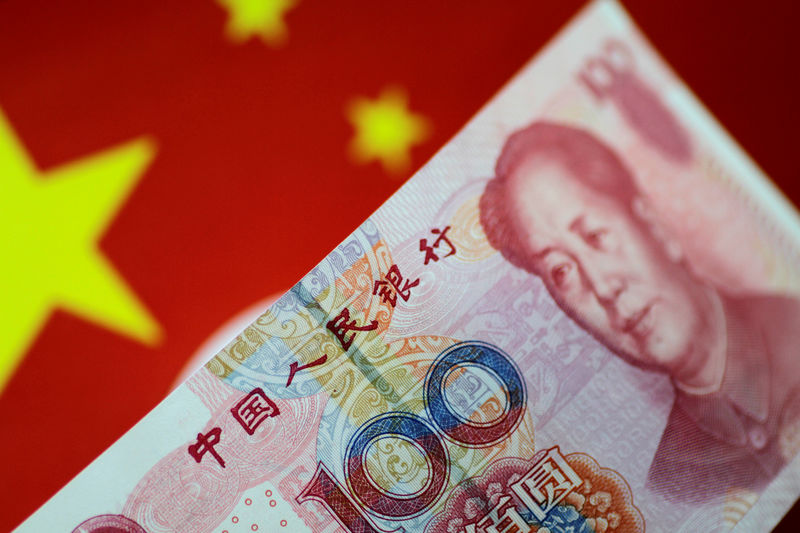By Kevin Yao and Winni Zhou
BEIJING/SHANGHAI (Reuters) - China's central bank is reasonably comfortable with the yuan's sharp gains against a dollar that is broadly weakening, but it could become an issue if gains against other currencies affect its export competitiveness, policy insiders and analysts said.
The yuan rose nearly 7 percent against the dollar in 2017, and is up another 3.5 percent this year to its strongest level since August 2015 - when the People's Bank of China (PBOC) stunned markets with a 2 percent devaluation.
Still, China posted strong export growth last year, thanks not only to improving demand globally but efforts to diversify its markets beyond the United States. That push has seen policymakers put a greater emphasis on assessing the yuan's value against a basket of currencies of its trading partners.
"It's obvious that they are pegging (the yuan) directly to the basket," said a source close to the central bank who declined to be identified due to the sensitivity of the matter.
On such a trade-weighted basis, the yuan has been remarkably steady, limiting the net impact on China's exports. China's CFETS RMB index was flat last year and has inched up only 1 percent so far this year.
But if other currencies in the basket were to fall relatively more against the dollar than the yuan, that could lift the trade-weighted value and cause some headaches.
"We want to absorb all factors that influence the yuan, not just the dollar... As long as there are no big imbalances, we will not use the exchange rate to adjust trade," said a second source.
The sources are involved in internal policy discussions but are not part of the final decision-making process. The PBOC did not respond to Reuters' request for comment.
COMFORT ZONE
Last year's resilient exports may have helped reduce any urgency for China to cap the yuan against the dollar, though trade relations with the United States remain a wild card.
Still, traders and analysts believe the central bank could stop the yuan from breaching 6.2 per dollar, which is seen pivotal as it would match the level just before the 2015 devaluation. On Thursday it was trading around 6.3.
On a trade-weighted basis, some market watchers think the yuan is also still within authorities' comfort zone, despite recent gains.
The index stood at 95.82 as of end-January, its strongest since June 2016. Analysts said weakness in the South Korean won was a factor in the rise.
"My view at the beginning of the year was they would be comfortable with between 94 and 96. If the market pushes it out, I would be looking to see if they respond in some way," said Cliff Tan, East Asian head of global markets research at Bank of Tokyo-Mitsubishi UFJ in Hong Kong.
The dollar is the largest component of the basket, followed by the euro and yen, but Beijing has nearly doubled the number of currencies to 24 in recent years.
"The dollar is still the most important in the basket but its importance has been falling," said another source.
Chinese authorities also remain reluctant to loosen capital controls restricting outflows, highlighting lingering concerns over renewed downward pressure on the currency and the risks of another bout of capital flight like that seen in 2014-2016.
"We should not worry too much about yuan appreciation," said one of the sources.
"In the short- to medium- term, yuan appreciation could fade. Instead, we should prevent yuan depreciation."
